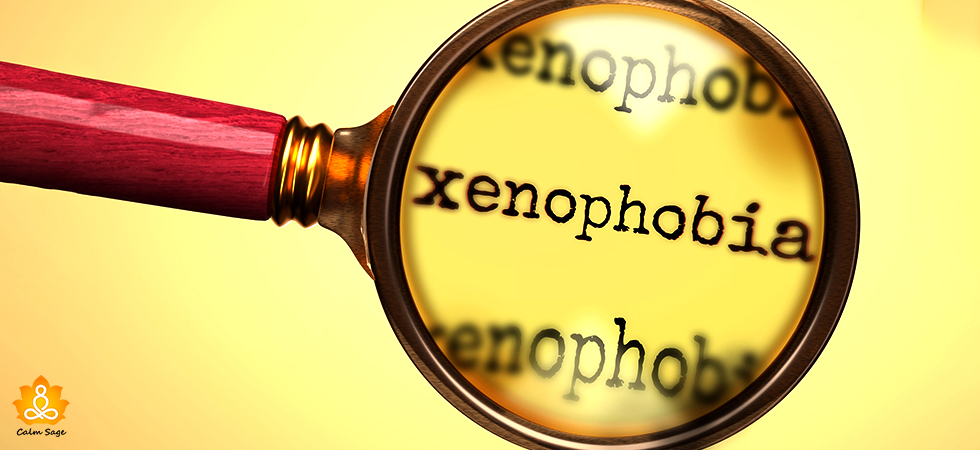Xenophobia: Characteristics, Types, Impact & How-To Deal With It

Xenophobia (pronounced zee-no-fo-bee-ah) can be described as fear or discomfort of strangers or foreigners. Hostility toward someone different from us (in ethnicity, language, etc) can be considered as a xenophobic act.
Xenophobia is a term that can be overlapped with other forms of discrimination and prejudice including racism and homophobia.
In many countries, hatred and racism towards immigrants have risen and this kind of xenophobic behavior has given rise to mental health concerns along with concerns for one’s safety.
In this blog, we’ll explore more about xenophobia, its characteristics, its types, its impact on a person’s overall well-being, and how can you address and deal with xenophobia and hatred that accompanies it.
Also Read: Top 10 List Of Phobias & Their Meanings
What Is Xenophobia?
By definition, xenophobia is “dislike of or prejudice against people from other countries”. Xenophobia can be targeted toward anyone who is a foreigner (or an immigrant). For example: ever since the pandemic, xenophobia has been directed towards people of Asian descent.
While xenophobia isn’t defined in the DSM-5 as a mental illness, it is one of the reasons why people are seeking mental health help.
Xenophobia has been there for thousands of years, but it became more noticeable ever since the 9/11 attacks in the USA. Back then, the hate and prejudice were directed towards people from traditionally Islamic countries and Muslim American people.
Many mental health professionals argue that xenophobia should be classified as a subtype of delusional disorder. In any way, xenophobia or xenophobic acts towards people create a significant impact and disruption in their daily life.
Characteristics Or Signs Of Xenophobia
The most common signs or characteristics of a xenophobic or xenophobia include:
- Feeling uncomfortable around people from a different ethnic group
- Avoiding specific areas or population
- Refusing to be in the vicinity of someone based on their skin color, dressing, language, ethnicity, etc.
- Difficulty in connecting with someone who has a different race, culture, or religion
While considered a phobia, xenophobics do not have a fear or phobia per se. The term is usually used to describe people who direct hate or show prejudice to immigrants or foreigners.
Types Of Xenophobia
Primarily, xenophobia can be classified as:
- Cultural Xenophobia: This type of xenophobia involves disregarding traditions, objects, or symbols that represent another culture or nationality. This includes; language, music, clothing, etc.
- Immigrant Xenophobia: This type of xenophobia involves disrespecting people or citizens of another country, culture, or nationality. This disrespect can lead to hostility, violence, and mass homicide.
Impact Of Xenophobia
Xenophobic acts of crime and hatred can have a significant impact on a person’s psyche. Small acts of vandalism or aggression can make someone feel depressed, anxious, unsafe, rejected, and constantly feeling like they are being endangered.
Xenophobia can cause a person to feel:
- Extremely depressed
- A decline in health – physical and mental
- Socially isolated
- Suicidal or may lead to think suicidal thoughts
Not only this, but xenophobia can also be linked to:
- Hostility and violence towards people of different culture
- Decreased economic and social opportunities
- Discrimination and bias towards people of other nationalities, and
- Hate crimes
This kind of behavior and attitude can make it difficult for people to live and thrive in society and can impact access to affordable housing, employment opportunities, and access to healthcare services as well.
Xenophobia not only affects or causes damage to others’ health but can also affect those with xenophobic thinking and attitudes.
How To Address Xenophobia
If you’re struggling with understanding the feelings of xenophobia, there are ways you can get help:
1. Therapy: With the help of CBT (cognitive behavioral therapy), you can identify the source of your hatred and learn how to change your perspective with the help of a therapist or a counselor.
Get 20% off on the First Month of Therapy
2. Broadening your perspective: Many people with xenophobia have limited exposure to other cultures. By learning more about other cultures, nationalities, and traditions, you can face your fears and clarify whatever you feel is holding you back from accepting others.
3. Pay attention to your behavior: When you experience or think about a xenophobic thought, pay close attention to it. Where are these thoughts coming from? What is causing them? Try to replace negative thoughts with positive and realistic ones.
4. Do not believe everything you see: Remember the phrase, “There’s more to life than what meets the eye”. Whatever you see or hear might not be true. You might be letting others’ opinions cloud your judgment.
How To Tackle Xenophobia?
If you’re on the receiving end of xenophobia and hate crimes, then the following tips can help you deal with it:
1. Finding A Strong Support System
Creating or finding a strong support system is one of the most helpful ways to cope with hatred and discrimination. Surround yourself with people who are encouraging and motivating. There are many online forums where you can get support.
2. Speak Up Against Bigotry & Hate Speech
When you hear someone remarking or saying something racist, speak up. If you see, hear, or read something racist or xenophobic, speak up. Staying silent can be a bigger crime than standing up for yourself.
3. Ask For Professional Help
If xenophobia is affecting your beliefs and health, then it is okay to ask for help from a professional mental healthcare provider. Many culturally sensitive healthcare providers can help you deal and overcome with your beliefs.
Also Read: How To Find A Culturally Sensitive Therapist
4. Share Your Experiences
Struggling with something as big as racism or discrimination can be traumatic. If you feel comfortable sharing your experiences with your family, friends, coworkers – then do! This will help you raise awareness about xenophobia and will also give others to stand up against such prejudices and speak up.
Final Words:
Xenophobia is more often than not rooted in a combination of upbringing, past experiences, and religious views. It is important to address these issues to promote diversity, harmony, and unity, especially in these trying times.
We sincerely hope that this blog helped you understand xenophobia and how to address it.
If you need additional information or support, you can contact us at info@calmsage.com or connect with us on our social media pages.
Take care of yourself and stay safe!
Next Read:
All You Need To Know About Decidophobia (Fear Of Making Wrong Decisions)
Fear of Expressing Emotions or Feelings: Animotophobia
Thalassophobia (Fear Of Large Water Bodies): Symptoms, Causes, And More




















